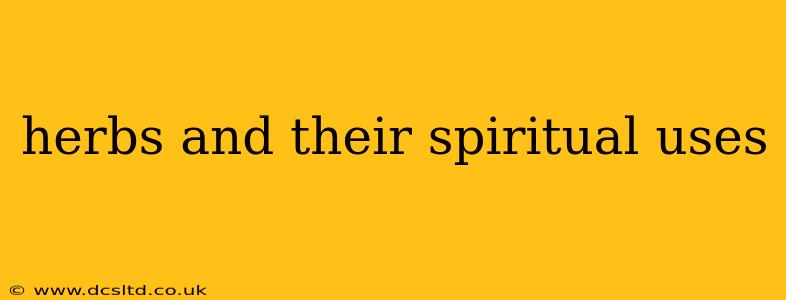For centuries, herbs have held a significant place in spiritual practices across diverse cultures. Their potent aromas, vibrant colors, and inherent medicinal properties have been interwoven with rituals, ceremonies, and personal spiritual journeys. This exploration delves into the fascinating world of herbs and their spiritual uses, examining both historical traditions and contemporary applications. We'll uncover the rich symbolism and energetic properties associated with various herbs, shedding light on their roles in enhancing spiritual growth, healing, and connection.
What are the most common herbs used in spiritual practices?
Many herbs boast a long history of spiritual use, with their specific applications varying across cultures and traditions. Some of the most common include:
- Sage: Frequently used for cleansing and purification rituals, sage is believed to clear negative energy and promote spiritual clarity. Burning sage (smudging) is a popular practice in many traditions.
- Lavender: Known for its calming and relaxing properties, lavender is often associated with peace, tranquility, and spiritual connection. It's frequently used in meditation and relaxation practices.
- Rosemary: This herb is linked to memory, remembrance, and spiritual protection. It's often incorporated into spells and rituals aimed at enhancing focus and recall.
- Chamomile: Associated with healing, peace, and rest, chamomile is often used in calming teas and baths to promote relaxation and spiritual introspection.
- Mint: Representing clarity and purification, mint can be used in rituals related to mental acuity and cleansing negativity.
- Basil: In some traditions, basil is associated with love, abundance, and protection. It's sometimes used in rituals related to attracting positive energy and fostering relationships.
How are herbs used in spiritual healing?
Herbs play a significant role in spiritual healing practices, often viewed as conduits for channeling energy and promoting holistic well-being. Their applications are diverse:
- Aromatherapy: Essential oils derived from herbs are used in aromatherapy to balance energy centers (chakras), promote relaxation, and uplift the spirit.
- Herbal Baths: Soaking in water infused with specific herbs can be a deeply relaxing and cleansing experience, aiding in releasing emotional blockages and promoting spiritual renewal.
- Incense: Burning herbs as incense creates a fragrant atmosphere, believed to influence mood, clear negative energy, and enhance spiritual focus during meditation or rituals.
- Herbal Remedies: Many herbs possess medicinal properties, and their use in traditional healing practices often has a spiritual component, focusing on balancing the mind, body, and spirit.
What are some examples of spiritual rituals using herbs?
Numerous spiritual traditions incorporate herbs into their rituals and ceremonies. Examples include:
- Smudging: Burning sage, cedar, or other herbs to cleanse a space or person of negative energy.
- Herbal Offerings: Placing herbs on altars or sacred spaces as offerings to deities or spirits.
- Creating Herbal Sachets: Filling small pouches with herbs for protection, healing, or attracting specific energies.
- Herbal Teas for Meditation: Drinking specific herbal teas to promote relaxation and deepen meditation practices.
Can you explain the symbolism of specific herbs in different cultures?
The symbolism associated with herbs varies across different cultures and belief systems. For instance, while sage is widely associated with purification, its specific meaning may differ subtly depending on the cultural context. Similarly, the meaning and use of rosemary, chamomile, and other herbs can exhibit variations across different traditions. Researching specific cultural perspectives adds depth to understanding the rich tapestry of herbal symbolism.
Are there any precautions to consider when using herbs for spiritual purposes?
While generally safe, precautions should be taken when using herbs for spiritual or medicinal purposes:
- Allergies: Be aware of potential allergies to specific herbs.
- Interactions: Some herbs can interact with medications, so consult a healthcare professional if you have any concerns.
- Quality: Ensure you source herbs from reputable suppliers to ensure their quality and purity.
- Intention: Always approach the use of herbs with a clear and positive intention.
This exploration provides a glimpse into the extensive world of herbs and their spiritual applications. Remember that the use of herbs in spiritual practices is deeply personal and rooted in individual beliefs and traditions. Further research into specific herbs and cultural contexts will undoubtedly enrich your understanding of this fascinating topic.
